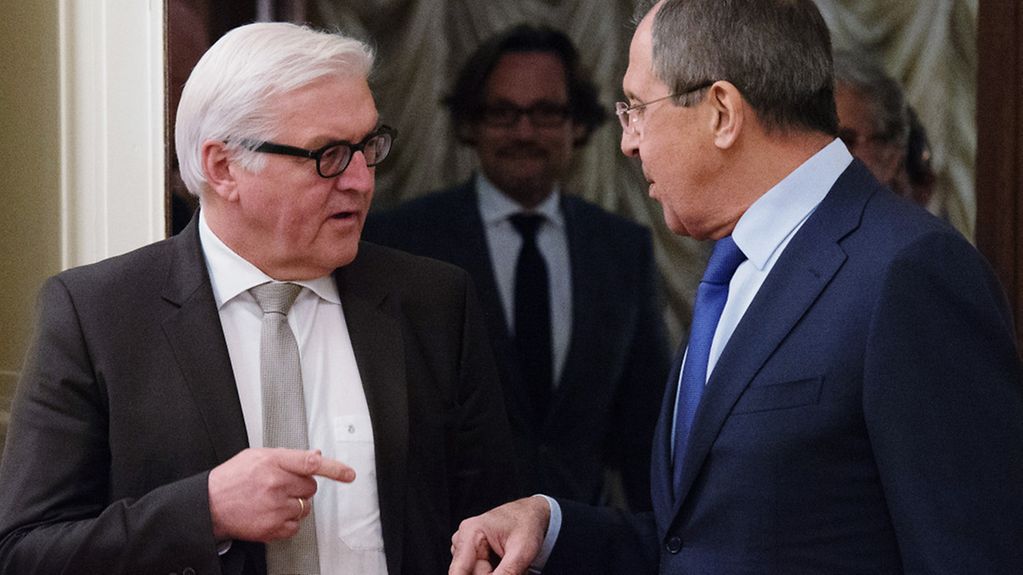Crisis in Ukraine
The Federal Government is leaving nothing untried in talks with Russia to find a diplomatic solution to the conflict in Ukraine. Federal Foreign Minister Steinmeier travelled to Kiev and Moscow to assess opportunities for a de-escalation of the situation. Previously, the Federal Chancellor had explained the Federal Government’s position on the conflict in Ukraine during her trip to Australia.
4 min reading time

Steinmeier und Lawrow sprachen in Moskau über den Ukraine-Konflikt.
Photo: picture-alliance/dpa/Blinov
Federal Foreign Minister Steinmeier travelled to Ukraine and Russia on Tuesday with the declared objective of finding out whether there is a chance of stopping a new escalation of the conflict. "Perhaps we need to look for new ways to reduce tensions in relations between the EU and Russia", said Steinmeier prior to his departure.
Meeting with Putin and Lavrov
In Moscow the Federal Foreign Minister met for talks with his Russian counterpart Lavrov. In this meeting Steinmeier stressed the need to adhere to the Minsk agreement. This is "a resilient document that now needs further work."
The conflict in Ukraine is "a really serious crisis for peaceful order in Europe", the minister said afterwards to the gathered press in Moscow. Steinmeier warned: "We are at something like a crossroads. 25 years after the fall of the Berlin Wall, there is once again the threat of voicelessness instead of dialogue, isolation instead of exchange and confrontation instead of cooperation."
Prior to his return flight to Berlin, the Federal Foreign Minister briefly met with Russian President Putin late in the evening. Talks at the Kremlin concerned the conflict in Ukraine and bilateral relations between Germany and Russia.
"The atmosphere of the talks was serious and open", the meeting lasted "considerably longer than an hour", reported Federal Foreign Office Spokesman Schäfer in today's Federal Government press conference.
Stabilising Ukraine
Prior to this, Steinmeier had first met Ukrainian Prime Minister Jazenjuk and then President Poroshenko in Kiev. Steinmeier told Jazenjuk that Ukraine has earned support for the country's political and economic stabilisation.
He continued: "I therefore support the European Commission's idea to hold a European conference as soon as possible so that a Compact for Growth for Ukraine can be set in motion."
Steinmeier said that he agreed with President Poroshenko that "we have to use every opportunity to avoid returning to a situation where there is the threat of a major direct military confrontation."
Merkel named three factors
In her address at the Lowy Institute in Sydney Chancellor Angela Merkel explained the Federal Government's position, which is supported at European level, too. Merkel named three factors.
"Firstly: We support Ukraine politically and also economically. Secondly: We are leaving nothing untried in talks with Russia to find a diplomatic solution to the conflict. Thirdly: We are imposing economic sanctions on Russia insofar as and for as long as they are necessary", said Merkel.
Objective: The territorial integrity of Ukraine
The Chancellor also again emphasised that the objective of all of these efforts is "a sovereign and territorially intact Ukraine that can determine its future itself."
The conflict cannot be resolved through military action, continued Merkel. But, she said, that is not to say: "Because we cannot resolve it militarily we cannot resolve it at all."
Old ways of thinking in spheres of influence must not be allowed to hold sway, the Chancellor stressed. She questioned Russia's influence on the foreign policy decisions of Eastern European countries: "This is not just about Ukraine, it is about Moldavia, it is about Georgia. If it continues like this, will it then be a question of Serbia and the Western Balkans, too?"
Conflict resolution takes time
Sometimes in politics you need to be patient, stressed the Chancellor, referring to her own experiences in former East Germany: "If we do not believe that our values are valuable, that at some point they will win through, then we may as well stop trying."
During the Federal Government press conference Deputy Government Spokesperson Christiane Wirtz added that it is about being patient. "There is no quick solution here." Results cannot be expected within a few hours or days, she said. The first objective is to maintain communication. In this way the other side's arguments can be heard and responded to.
Federal Foreign Minister Steinmeier in Brussels, Kiev and Moscow
At the meeting of foreign ministers in Brussels on Monday talks focused on the conflict in Ukraine as well as the Middle East and Libya. Prior to the meeting, Federal Foreign Minister Steinmeier stressed that the ministers agreed on the need to support Ukraine.
"We are urgently called upon to assist with the political and economic stabilisation of Ukraine. I am grateful that the first proposals for this have been issued by the EU Commission, too."
On Tuesday the Federal Foreign Minister will travel on to Kiev and Moscow. The aim of the trip, according to Steinmeier, is to find out whether there is a chance of stopping a new escalation of the conflict. Steinmeier also said:
"Perhaps we need to look for new ways to reduce tensions in relations between the EU and Russia."